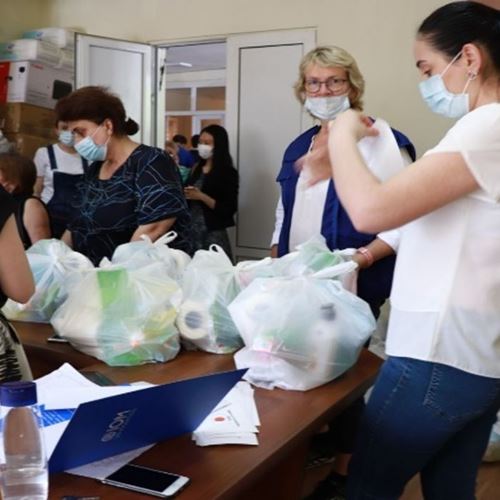Schnorrhakalutyun!
Thank you in Armenian! Although the language here is quite difficult for a newcomer, the people are so helpful and understanding and the country itself so beautiful it makes it a very worthwhile and enjoyable experience to be stationed here.
The ongoing conflict over disputed areas in and around Nagorno-Karabakh (NK) erupted into violent clashes in September 2020, with a trilateral ceasefire agreement signed between Armenia, Azerbaijan, and Russia in November 2020. Many thousands of lives were lost on both sides, and land previously controlled by Armenia was handed over to Azerbaijan as part of the agreement. Over the two months of fighting more than 90,000 residents of NK fled to Armenia as they are mostly of Armenian ethnicity. Many were able to stay with friends and families but many collective centers and shelters were also set up. The UN response in Armenia was rapidly scaled up to provide support to those displaced from NK. However, due to several issues raised by the Azerbaijan government, access by UN agencies directly to the population inside NK has still not been granted. The matter has been elevated to the highest levels of the UN with the Secretary General himself involved in some of the access discussions. To date, only a very few international and local NGOs have been able to establish a presence in NK to provide direct medical and humanitarian assistance.
Earlier this year, I was very fortunate to be deployed by DRC to IOM, the UN Migration Agency, as the Emergency and Post-Crisis Coordinator for this emergency response to the displacement of the NK population. IOM received some CERF emergency funding to implement a two-stage health program to address urgent health needs of the people displaced by the NK conflict. IOM assisted with the provision of lifesaving primary health care services and Mental Health and Psychosocial Support (MHPSS). Two mobile multi-disciplinary health teams were dispatched to the displacement locations to provide access to primary health care services, consultations, and referrals to higher level health care as well as to focused and specialized MHPSS services. Additionally, dedicated MHPSS assistance is provided with access to counseling services for people who may need further support.
My role was to oversee the implementation of the IOM emergency response as well as be the focal point and liaison with the interagency UN team. The CERF project for the mobile clinics and the MHPSS support is also my responsibility to ensure it is completed in a timely and cost-efficient way.
With Japanese donor funding, IOM was able to purchase household NFIs for distribution to both the displaced families. These packages included hygiene items (detergents, soap, toilet paper, shampoo, toothpaste, and toothbrushes) as well as protective masks, and hand sanitizer for personal use against the spread of covid-19. We have also undertaken post distribution monitoring visits to some of the provinces we have provided support to ensure that the beneficiaries received the appropriate NFI packages.
We are now seeking further funding support to enable the implementation of agriculture activities to provide some much needed income for those displaced who cannot return to their area of origin, either for security reasons or that their land has been given back to Azerbaijan.
There have been many challenges to providing an effective and efficient emergency response in Armenia. The political situation is very complex. Although the war was officially “ended” with the signing of the trilateral ceasefire on November 10, 2020, there is still a lot of unrest at the Armenia-Azerbaijan border and general mistrust of both sides of the agreement. National elections are scheduled to take place in June, but there is some uncertainty as to whether they will eventuate or not – this may lead to more unrest in a very beautiful, but troubled, country.
